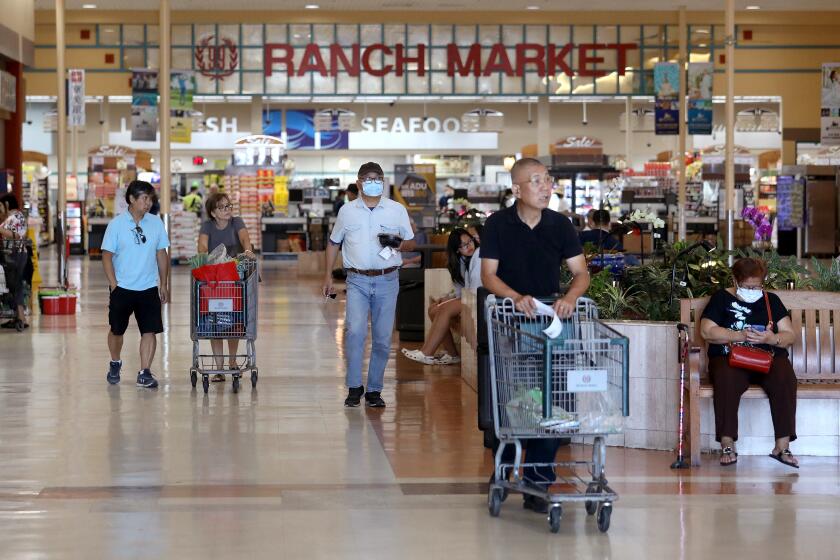Opinion: What did the Asian American vote this year tell us?

- Share via
The 2024 election results make clear: The Asian American electorate has shifted further right. The trend portends a new future for this voting bloc that bodes well for the Republican Party. And it has been brewing for years.
Asian Americans did back Kamala Harris, who received 54% of their vote, according to Edison Research exit polls conducted with a consortium of news organizations. Yet the 39% who supported Donald Trump — despite Harris’ South Asian background and efforts to solicit voters of color — reflect the decline of the Democratic Party’s grip on Asian American voters. In 2020, Joe Biden received 61% of the Asian American vote compared with Trump’s 34%. Four years prior, Hillary Clinton received 65% compared with Trump’s 27%. Since 2016, Trump has managed to pull more Asian American voters to his side. This statistical trend indicates that the nine-year phenomenon of Trumpism is climbing. But something bigger and with a longer history is happening too.
To be sure, the 2024 polls suggest that like other demographic groups, Asian Americans were chiefly concerned about the economy. And for some, pocketbook issues such as inflation, gasoline prices and other day-to-day expenses took priority over Trump’s scandals, JD Vance’s gaffes and the GOP’s longtime differences with Asian American voters on issues including education and healthcare. According to AAPI Data, a research project based at UC Berkeley, Asian Americans and Pacific Islanders comprise 3% to 12% of the electorate in Arizona, Georgia, Nevada, North Carolina and Pennsylvania. Voters cited the economy as their top issue in these battleground states; Trump won them all.
Asian Pacific Islander candidates are running against Latino opponents in districts that take in all or portions of the Eastside.
Moreover, Republican operatives and conservative media have argued that undocumented immigrants threaten safety and eat up resources reserved for citizens, thus explaining why Americans, including middle- and working-class Asian Americans, live paycheck to paycheck. (Studies show that immigrants commit less crime than native-born Americans and that the undocumented pay billions in taxes every year.) Some Asian immigrants and refugees in particular feel they settled in the U.S. the “correct” way. Conservative messaging helps convince them that undocumented individuals sully the dignity of the legal pathways to citizenship that they took.
Culture wars are also worth consideration. For religious people of color including Latino Christians, Filipino and Vietnamese Catholics, and Chinese and Korean evangelicals, Democrats’ positions on abortion and gender identity are contrary to their churches’ views. Finally, Democrats have lost their credibility as advocates for the working class — a critique that has been coming from the left since Bernie Sanders popularized democratic socialism. Pundits and strategists alike have acknowledged that the Democratic Party is now perceived as the party of highly educated elites, A-list celebrities and wealthy cosmopolitans culturally out of step with everyday Americans.
For Asian immigrants who came here to chase the American dream, the GOP’s unabashed nationalism à la “America First” (or “Make America Great Again”) has appealed to families who embrace the traditionalism of a real or imagined yesteryear. That traditionalism may also play to colorism, racism or a tacit approval of white supremacy within segments of the Asian American Pacific Islander community.
Beyond national politics, in reliably blue California this week, the left was shocked to see voters reject propositions to increase the minimum wage and expand access to rent control. Asian Americans in the state have been especially vocal about backing Proposition 36, which would result in harsher criminal penalties. It passed. And in the Democratic bastion of San Francisco, the top contenders in the battle for mayor were solid moderates. Daniel Lurie won, but both he and incumbent London Breed campaigned to Asian Americans, particularly a large Chinese American community, as pro-business and tough on crime and have distanced themselves from “woke” politics, which have largely hurt progressives. Similar trends have occurred in California at large and in New York.
How new arrivals remade the east San Gabriel Valley — and assimilated in it.
While it appears that liberalism has stopped resonating with Asian American voters the way it once did, this is not a one-off shift. In 1992 and 1996, among the earliest polls for which Asian American voters were a large enough group to survey, they backed the Republican candidate for president. Al Gore broke that trend in 2000.
Even though GOP enthusiasm dwindled, it didn’t go away. Rather, it stayed steady and quiet — until 2008. The emergence of a new Asian American right arguably began with the successful mobilization of Chinese evangelicals backing Proposition 8 in California to ban same-sex marriage — a right now protected federally by Obergefell vs. Hodges and in the state by this year’s passage of Prop 3 (one victory for the left, on a social issue). This energy continued with the multiple affirmative action court cases in the 2010s and 2020s. Since then, Asian American conservatism has continued to grow, including among those who don’t call themselves Republicans.
It is too soon to determine whether 2024 is indicative of a full or long-lasting political realignment. What is clear, however, is that the Republican Party is broadening its base to include more Latino men, younger white males, people without college degrees and eligible voters who rarely vote. If the trend lines continue as they have since 2016, Asian Americans could join that coalition. It depends considerably on how long Trump and the GOP can keep this momentum.
James Zarsadiaz is an associate professor of history at the University of San Francisco and is the author of “Resisting Change in Suburbia.” He is working on a book about Asian American conservatism since the Cold War.
More to Read
A cure for the common opinion
Get thought-provoking perspectives with our weekly newsletter.
You may occasionally receive promotional content from the Los Angeles Times.












